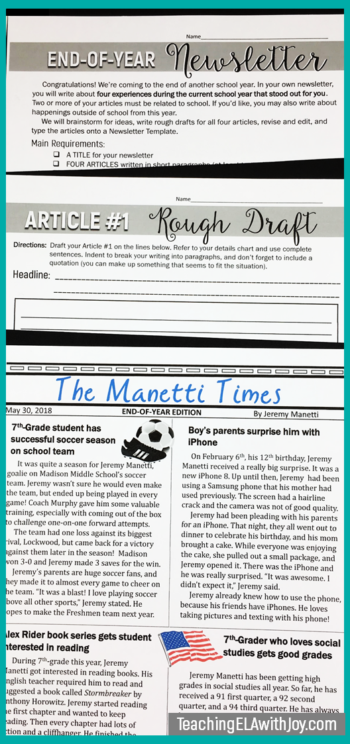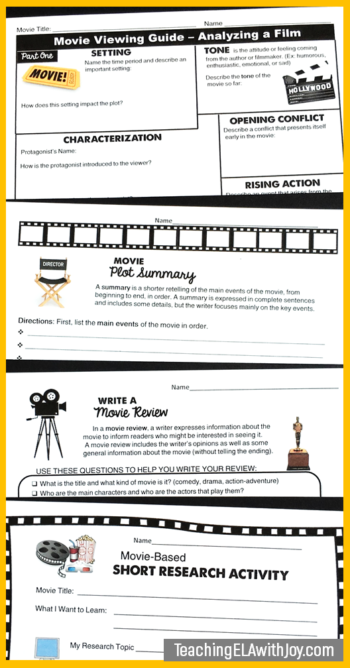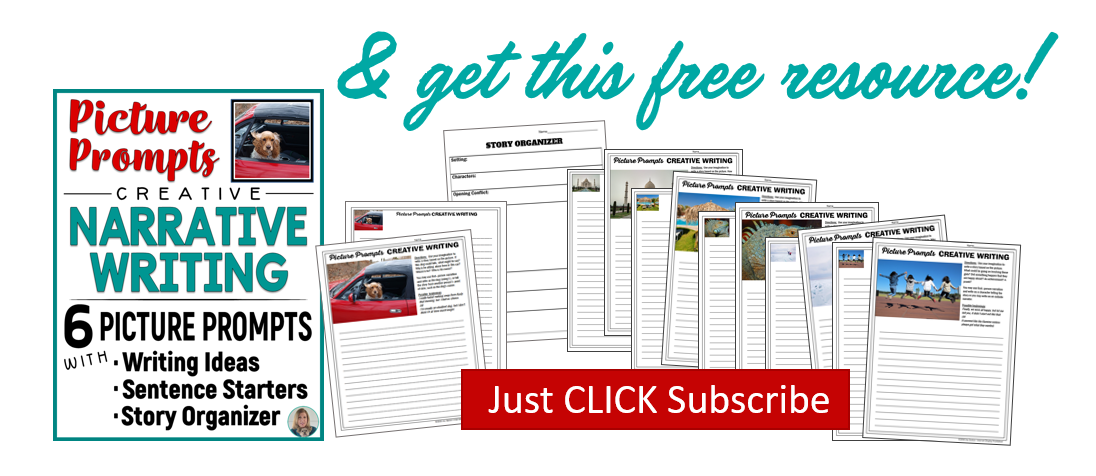
The end of the year can be an exciting time for both teachers and students! Who doesn’t look forward to summer break, right? But with that anticipation sometimes comes the question How can I keep my students focused on learning? In class, it takes a little more to hold their attention. Have you noticed grades have a tendency to drop off for students late in the year? And besides keeping up with lesson plans, grading, and managing classes, teachers always have added end-of-the-year responsibilities.
So how can you power through to the finish like a champ? You’re teaching reading and writing to middle school students anxious for summer vacation! Let’s look at my 10 End-of-the-Year Survival Tips for English Teachers:
1. Keep a “business as usual” mindset. What I mean is, as it gets closer to summer outside, don’t let the climate inside your classroom change. Whatever your classroom management system has been, don’t start letting up. It’s best to stay as consistent as ever. Let students understand that you will continue to assign those lunch detentions and make parent phone calls (or whatever your process has been) as needed.
2. Assign creative projects. After state testing is out of the way, students welcome the opportunity to do something creative and different. This would be a great time to think a little outside the box when writing your lesson plans. My students really enjoy our Persuasive Writing Project. Each student gets to create a business that he or she would like to open. It’s so fun to watch them draw out their building and floor plans, write their business proposals, create advertisements, and give presentations! To check it out, click here.
An engaging quick project I use right after testing is FREE in my store. It’s a Book Recommendation Poster, based on their independent reading. You’l love displaying these book posters around the classroom!
3. Consider a whole-class novel. Teaching a whole-class novel at the end of the year has its benefits. Students can stay anchored in a great story, have meaningful discussions with life lessons, uncover the beauty of rich writing as a community of readers, and support each other in partner and small-group formative assessment. As an added bonus, if there’s a movie for the novel, you’ve solved your lesson plan dilemma for those last few days of school! Students can compare and contrast the text and film versions as they watch.
4. Create a review packet in the form of a scavenger hunt. If you’re giving a final exam, you’ll want students to have some end-of-the-year review notes. Even if you’ve decided against testing, it’s still not a bad idea to require a review packet. It refreshes students on the skills you’ve taught over the year. (Less chance of them telling next year’s teacher they never learned it, right?)
Another benefit of a review packet is students can take it out when they’ve finished other work. I can say, “Okay, when you’re done with your draft, continue working on your scavenger hunt review packet.” To make the packet, look over all the handouts and lessons you’ve used during the year and glean topics. I create a 6-8-page handout with terms and/or practice examples with space for responses. Vary the look of the response areas by using lines, bulleted lists, boxes, and ovals. Just to make it sound exciting, I name it Scavenger Hunt Review. The “scavenger hunt” name works because students have to search for definitions, rules, or examples by looking through their binder, notes, interactive notebook, provided glossaries, online sources, or any other place you would have them look. Copy the review packet on colored paper to easily catch your students’ attention.
5. Let students reflect on their year. Your students are becoming increasingly aware that in a few short months, they will no longer be sixth, seventh, or eighth graders! They will appreciate an opportunity to reflect on their current school year. Give students an end-of-year survey to let them express their opinions on which assignments they enjoyed or learned from the most, their suggestions, etc. You could also offer journal topics like Looking back on eighth grade or Looking ahead to ninth grade.
One assignment I love for student reflection is our End-of-Year Newsletter short project. Students write four news-style articles reflecting on experiences from their school year and type onto an editable newsletter template. They write headlines and import visuals. I love that students utilize the writing process and practice narrative writing. The newsletters look so cool on display!
6. Make your final independent reading assignment due well in advance. If you have assigned a book response or independent reading assignment of any kind, make the due date about four weeks before the end of classes. This early date is to ensure that 1. you have enough time to grade the assignment and return it, AND (more importantly) 2. you have enough time to get all of your precious classroom novels returned. Believe me, you will thank yourself. There’s nothing more frustrating than discovering you have several novels still out, and time has run out! The buses are pulling out of the loop!
7. Keep blank BINGO pages on hand for fun review. If you need a quick lesson plan where students are motivated, just make a list of 35 topics and buy a bag of bubble gum or Jolly Ranchers. I keep a stack of blank BINGO pages in my file cabinet, and definitely pull them out at the end of the year. BINGO is great for literary terms, parts of speech, and grammar rules. Of course, you can also include vocabulary.
Project a list of your alphabetized terms (try for 35) and let students choose 24 for their card. They copy them down, which will take some time. Then you can give them study time! You might do a round calling out just the term, with you giving the definition (to re-teach). But after that it’s definitions only, and students have to know the correct term to cover. Just cut up construction paper to make cover chips. When a student calls BINGO, have a nearby student call out their covered terms to verify correctness.
You will need to make 2 “master cards” so tape two blank pages together and write in all of the terms alphabetically. Cut one up into the pieces you’ll pull out of an envelope, call out, and then use to cover the terms from that round on your other master. Students are really attentive during review BINGO, and when they come in next class they always beg for more!
8. Don’t grade every last assignment. The end of the year is crunch time in so many ways! Prioritize what needs to be graded and what can be checked off with participation or effort points. If it was strictly practice, even though you collected it, it does not have to be graded. Also, feel justified taking some shortcuts. For example, when grading an assignment with three body paragraphs, you don’t have to necessarily read EVERY word. You’ll know after the second body paragraph whether your student used topic sentences, transitions, and vivid language. Skim the conclusion, mark the rubric, assign a grade, and move on.
9. Use literary-themed movies. There are so many awesome movies out there based on famous novels, both contemporary and classic. And we’re, well, English teachers, right? You and your students just might need to change it up after a unit and view a great story. Students could track how themes develop, or work on a plot chart or movie guide. On movie days, students feel like they’re being treated to something special. For us, well, we might get time to squeeze in a few extra tasks, like grading!
10. Keep your classroom intact until the very end. Leave your bulletin boards and other displays in place. If students notice that you have started to take everything down, they get a signal that things are different now. I even put up new displays of student work when we have only three weeks left of school! On the last 2-3 days, when students come into class, I let them take down their own work if they want it. I have students help pull everything else down during the last study hall.
Also, resist any urge to box things up! Sure, you can do some weeding out and organizing of your materials, but the less noticeable the better. Remember, you absolutely want to maintain that “business as usual” learning environment.
So teachers, here’s to a fantastic last stretch! Share your own end-of-the-year survival tips in the comments!







Where can I find your movie viewing guide? Is it available on your TPT account?
Yes, in my TpT store. If you click on the words Movie Guide in this post or on the movie guide image. you will get linked to the resource. Thank you!
Good and useful articles!)